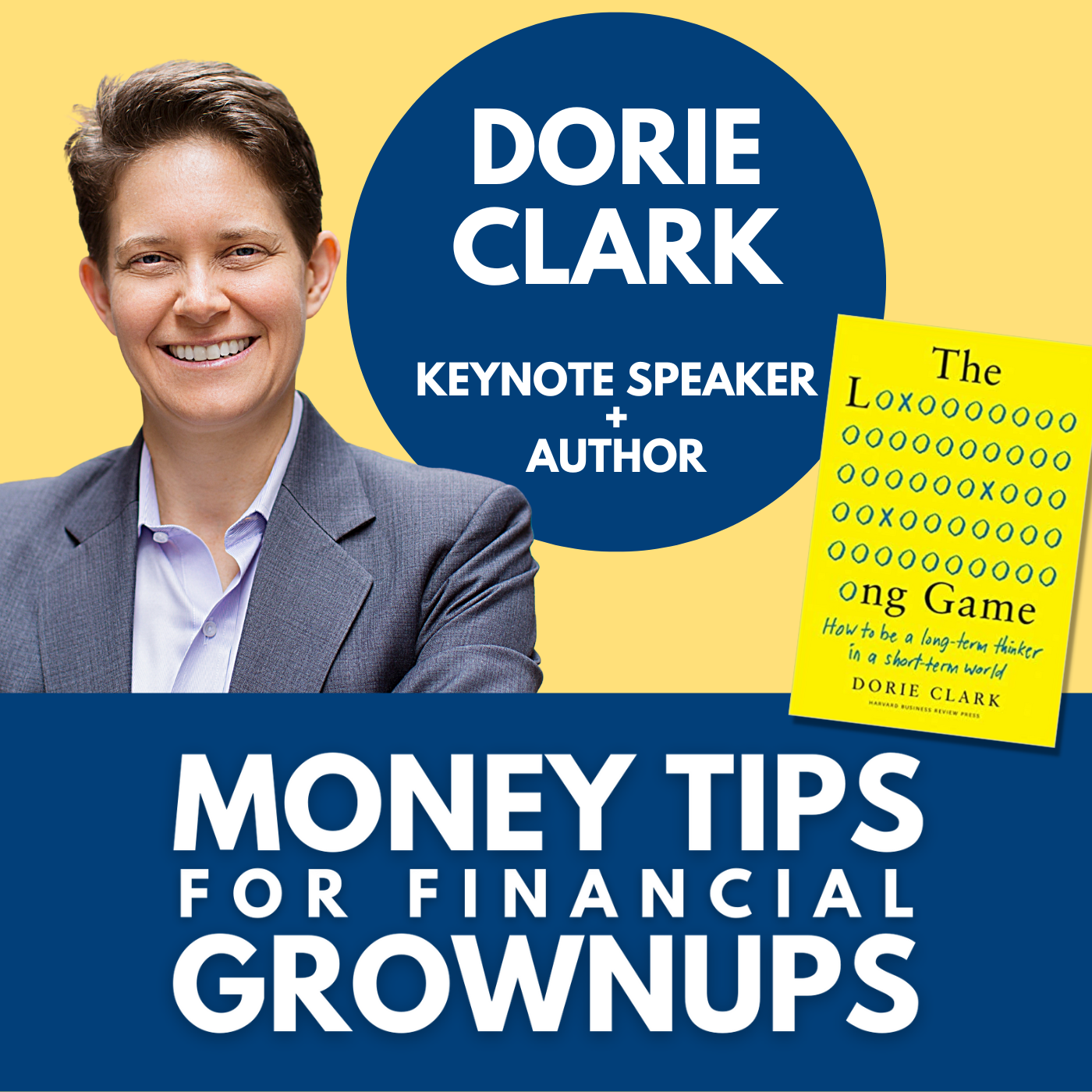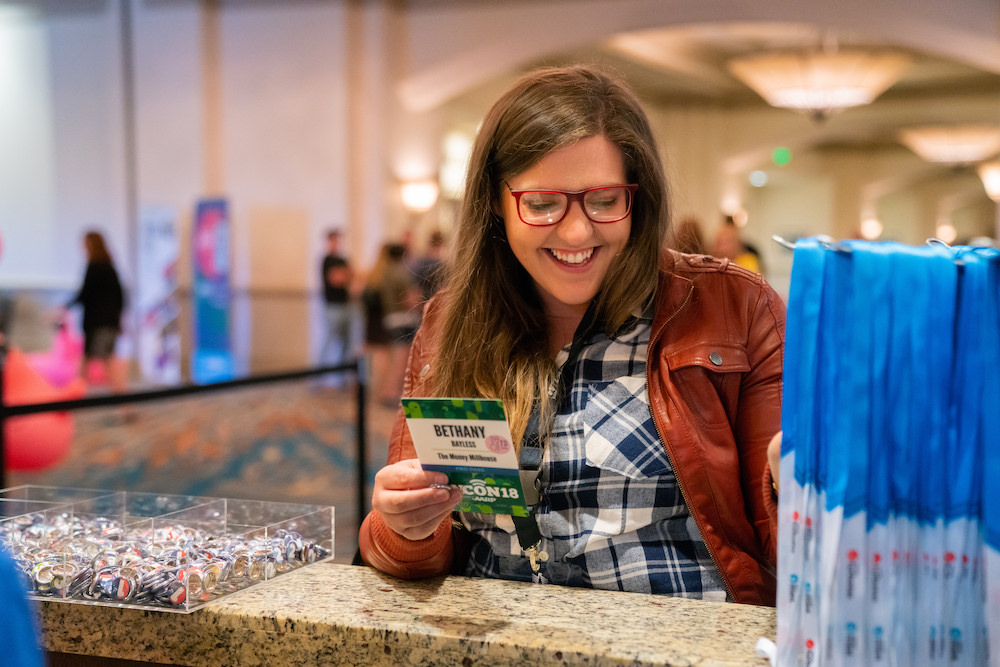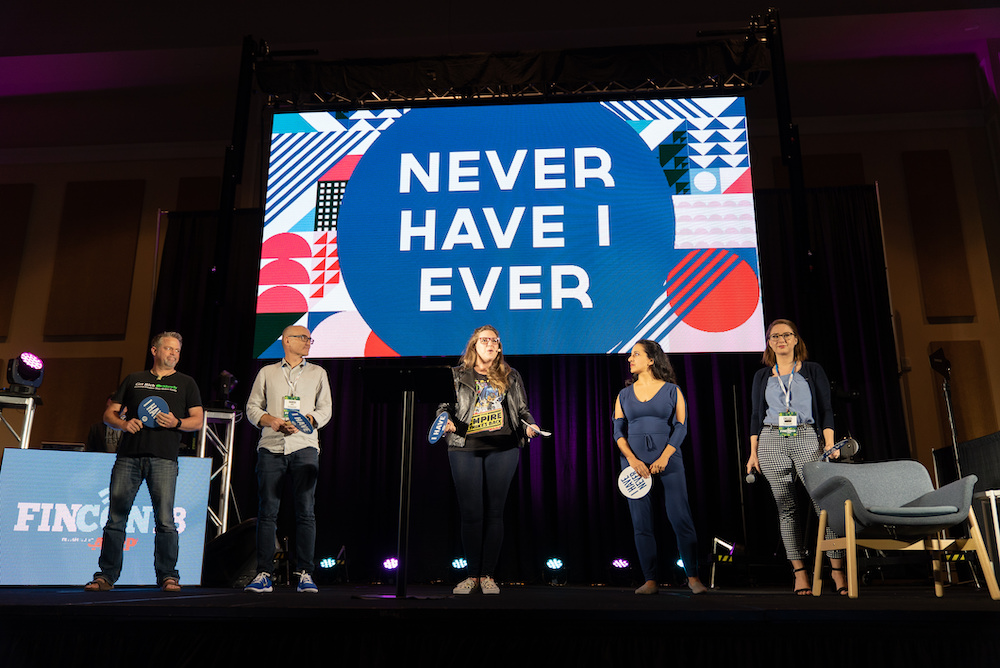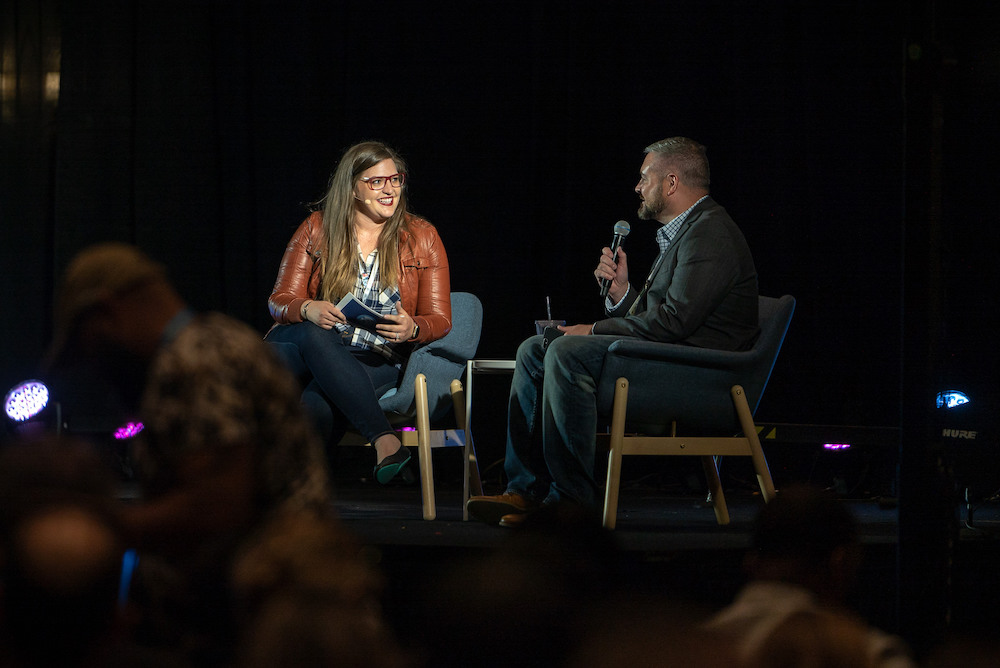Dorie Clark shares game-changing tips to upgrade our work and personal lives including a new alternative to the passion vs. money career debate, jet-lag productivity, heartbeat income and working more hours- in less time.
5 Money Tips To Play And Profit At The Long Game
Rethink Multitasking
Use Jet lag for productivity
Do something interesting
Ask- but wait a year first
Patience leads to the pay off- but don’t be passive
Follow Dorie!
Instagram - @dorieclark
Facebook - @dorieclarkauthor
Twitter - @dorieclark
LinkedIn - @doriec
YouTube - @DorieClark
Website - dorieclark.com
Follow Bobbi!
Instagram - @bobbirebell1
Twitter- @bobbirebell
LinkedIn- Bobbi Rebell
Website- http://www.bobbirebell.com
Did you enjoy the show? We would love your support!
Leave a review on Apple Podcasts or wherever you listen to podcasts. We love reading what our listeners think of the show!
Subscribe to the podcast, so you never miss an episode.
Share the podcast with your family, friends, and co-workers.
Tag me on Instagram @bobbirebell1 and you’ll automatically be entered to win books by our favorite guests and merch from our Grownup Gear shop.
Full Transcript:
Bobbi Rebell:
I hope you guys are all celebrating some big adulting milestones this season, and you know what? Finding the perfect gift for those celebrations can be kind of tough. I have the solution over at grownupgear.com. We have adorable hats, totes, mugs, pillows, tees, and seriously, the most cozy and comfortable sweatshirts. They're all on grownupgear.com, and all at affordable prices. We even now have digital gift certificates, if you can't decide. Use code GROWNUP for 15% off your first order. Buying from our small business helps to support this free podcast, and you know what? We really appreciate it. Thanks, guys.
Dorie Clark:
Lower the stakes a little bit, because honestly, thinking about what is my passion is the dating equivalent of meeting somebody on OkCupid And then the next day your friends just keep saying, "Well, is he your soulmate? Is he the one?" It's like, "Oh my God, I don't know. Give me some time."
Bobbi Rebell:
You're listening to Money Tips for Financial Grownups with me, certified financial planner, Bobbi Rebell, author of How to Be a Financial Grownup. And you know what? When it comes to money, being a grownup is hard, but together, we've got this.
Bobbi Rebell:
Welcome, Grownup friends. You guys are in for a treat. This week's interview is someone I have been trying to get on the podcast for quite some time. It is Dorie Clark. She is the author of the new book, The Long Game, it's her fourth book actually. If you're not familiar with her, and frankly, even if you are familiar with her, you're going to be so happy to listen to this episode. You're going to get so much out of this.
Bobbi Rebell:
Dorie is a big time public speaker, thought leader, and as I mentioned, an author and so much more. We totally hit it off. She covered some great topics for us, including what we can do if we haven't found our big passion. We all talk about follow your passion, but some of us, it's not so obvious what that passion is, but Dorie has a great solution.
Bobbi Rebell:
We also talked about super easy ways to up our productivity. Yes, you can have more than 24 hours in a day apparently. I'll tell you, some of these things were obvious once Dorie pointed them out, but they really weren't obvious to me beforehand. They're easy things that we can do once we know how to do them from Dorie. You'll see, we were doing it all wrong.
Bobbi Rebell:
Also, we're going to talk about what we can learn from the amount of time it takes to learn to do a handstand. It was a great story and it made so much sense. If we're being honest, I, by the way, can not do a handstand and I'm not going to put in the time to do this handstand thing, guys, but the lesson that Dorie is going to give us totally works. This is all going to make sense. I know this was a little bit confusing, but just trust me. Listen to the interview. Here is The Long Game author, Dorie Clark.
Bobbi Rebell:
Hey, Dorie Clark. You're a financial grownup.
Dorie Clark:
Bobbi, thank you so much. I'm so glad to be here with you.
Bobbi Rebell:
Well, I'm so glad to finally have you on. I've been a fan of yours since our mutual friend, Danielle Towne, introduced us a few years ago, and at that time started reading your books, Reinventing You, Entrepreneurial You, and you have some other ones in the mix, but most recently, The Long Game: How to Be a Long-Term Thinker in a Short-Term World. You can see all of the tattered pages. Congratulations.
Dorie Clark:
Thank you. It is amazing. It looks like a dog attacked it. I'm glad you were that voracious with it.
Bobbi Rebell:
Well, I read it by the pool, so there was a little bit of suntan lotion and water and all that stuff, but it was truly loved, mainly because I know you as the super successful Dorie Clark, you're such a celebrated thought leader, but you're very vulnerable in this book.
Dorie Clark:
Thank you. Well, one of the things that has been challenging for me over the course of writing books, and this is my fourth one, and it's not necessarily a philosophical or emotional challenge, but it's actually just overcoming training. But I started my career as a journalist, specifically a political journalist, and the thing that you learn above all else is you are not the story. You are not the interesting part of the story, you write about other people. That was the frame that I was coming from. Over the course of writing my four books, I've come to learn that actually, in terms of what connects with readers, what seems to really make an impact, that's exactly wrong. I mean, what we look for in the news I think is very different than what we look for in business or career books.
Dorie Clark:
Over time, the part that people seem to respond to the most strongly was actually hearing some of my own experiences, and so over the years, I've really learned to weave more about what I've done and what I've tried and what I've gone through into the books as a compliment to the narrative and the reporting that I did. I'm really glad that you responded to that.
Bobbi Rebell:
I really did. The book is very relatable and I think a lot of people in our Grownup audience will feel the same way. You have a lot of incredible money and, frankly, life tips in the book. I want to dive right into those. I have five that I've highlighted. The first one is you talk about rethinking multitasking, because multitasking has gotten a lot of pushback in recent years, but you have a different perspective.
Dorie Clark:
Absolutely. It is completely true that perhaps what we think of when it comes to multitasking is bad. That would be the equivalent of like, "Oh, I'm actually pretending do a podcast interview with you, Bobbi, but I'm actually checking my email," and that is not true, by the way.
Bobbi Rebell:
You could pull it off.
Dorie Clark:
Well, the truth is, if you're trying to use the same parts of your brain, something is going to slip and it's just going to be suboptimal all around. But something that I realized, through some very meticulous time-tracking studies that I did over the course of several years, is that actually there are very complimentary activities that you can do. I mean, some examples might be working out and listening to a professional development book, or taking a walk and calling your mom, or whatever the case is, but it's two activities that you can do both of them equally well at the same time. It could be a cooking dinner with a friend, So you're doing a chore, but you're also visiting with someone that you want to spend time with. During my time tracking, I actually would double count those activities if I could legitimately do both of them equally well, and I came to realize that I'm actually able to build in about 28% more time into my week by doing that. I've become a huge fan of strategic multitasking.
Bobbi Rebell:
What I love about that is it's the anti-workaholic mentality, because it's giving you more downtime.
Dorie Clark:
Absolutely. It's really just being a little bit more thoughtful. I mean, sometimes we fritter away these moments. I mean, I remember back early in my career when I didn't live in New York and I had a car and I'd drive to work, sometimes I just wouldn't think about it and I'd put on top 40 radio and most of it was just listening to advertisements. I mean, that is legitimately wasted time. Whereas, with a little bit more thought, you're listening to some kind of an educational podcast, like this one, or you're listening to an audio book and you're actually using that as professional development time.
Bobbi Rebell:
Number two, use jet lag for productivity.
Dorie Clark:
Yes. Speaking of things that we normally treat as wasted time, jet lag is often a top of the list. I mean, we all know, when we're jet lagged, you're not going to get anything "meaningful" done in terms of the way that we normally think of meaningful work. I mean, you can't do anything detail-oriented, you're propping your eyelids open, you're not much use, but what I came to realize is that, actually, we can begin to think about that time differently.
Dorie Clark:
Now, I would never say, "Oh, let's do your QuickBooks when you're jet lagged," that would be a bad move, but what I actually did one time, sort of inadvertently, was I was jet lagged on a trip to Russia and I ended up being able to do basically an entire year's worth of strategic planning while I was keeping myself awake at a cafe, partly because when you are jet lagged in that way, when you're half sleep deprived, your brain is able to make creative associations that are not necessarily logical and linear. I was able to be a lot more big picture about my thoughts and it enabled me to do better strategic planning than if I actually had been well slept and in a more logical frame of mind. I think it's really about matching your energy and your state of being to the tasks that are most appropriate at that time.
Bobbi Rebell:
Number three, this one, I love this because it's a strategy that solves the issue of should you follow your passion or should you follow what's going to make a lot of money. You say focus on doing something interesting.
Dorie Clark:
Yes. What I've seen, and I'm sure you probably have too, Bobbi, is that there is so much pressure in our culture to find your passion. What's your passion? You don't know what your passion is? People can feel kind of inadequate and browbeaten at a certain point if you're not following your passion. I know a lot of people, smart, talented, hardworking people, that maybe they've reached a point where they have been working so hard and so long, they might not even necessarily be sure what their passions are anymore. With the work and the kids, they have kind of turned that part off because it's not even something you can really dwell on.
Dorie Clark:
What I wanted to do in my book, The Long Game, was to lower the stakes a little bit, because honestly, thinking about what is my passion is the dating equivalent of meeting somebody on OkCupid And then the next day your friends just keep saying, "Well, is he your soulmate? I mean, is he the one?" It's like, "Oh my God, I don't know. Give me some time." Instead of looking for the passion, instead of looking for the soulmate, what I suggest is just do what's interesting, just explore something that seems interesting. It's a low bar, but almost all of us are at least able to tell, okay, this seems interesting to me or not. Then if it stays interesting, keep moving in that direction, and if it doesn't, it's your signal to pivot. I think that that is sometimes a more sane and sustainable way to begin to move in the direction of things that you care about more.
Bobbi Rebell:
And by the way, that can evolve. We're not going to go too deeply into it because I want people to read it more fully in the book, but one thing you weave throughout the book that I loved hearing about is your passion for theater, which was not something you did as a kid. You weren't a theater kid on stage every day, but you started to develop it and now it's evolving into perhaps a business. I can't wait to see the rest of the story evolve, but it can be something that sort of weaves through your life through different things, even taking a comedy course, different things that you did.
Bobbi Rebell:
But in the interest of moving on, we're going to go to number four because otherwise we'll just go on a million tangents with you. Number four, ask, but wait a year first. Because we do push people to go, go after that mentor, get a champion, get someone who's going to be a sponsor at work, but it's a little delicate. You say a year, that seems so long.
Dorie Clark:
It's true, it's true. I like to be a little extreme in this because I think that we have a cultural problem, because certainly in the United States, but in many other countries as well, where we have internalized way too much, the mentality of, well, it doesn't hurt to ask. I would like to say, actually yes, sometimes it does hurt to ask, because if you are making an inappropriate request too early in a relationship, you will destroy that relationship. Now, where people go sometimes is they say, "Oh, well I don't want to be a wallflower. I don't want to be stupid about things." Well, the point is, it's not that you never ask, it's that you have to let a relationship evolve to the point where the ask is appropriate and contextual.
Dorie Clark:
I mean, I am sure this is probably the case for you, Bobbi, with your business and the media profile that you've cultivated. I certainly experience this as well, where I will meet somebody, maybe at an event, maybe we connect on LinkedIn or something like that, and then five minutes later they're saying, "Oh, hey, I see you're connected to so-and-so," insert super prominent person, "Can you connect us?" It's like, "Wait, I don't even know anything about you." Also, people don't really get this context, but a million people are asking the same thing. I don't want to blow up my relationship with somebody by sending them five random people a day. It's important to be thoughtful and to be judicious.
Dorie Clark:
It's not like ask them anything. If it's like, "Oh, Bobbi, I really like that sweater. Where did you get it?" Fine, ask them that, but I'm talking about wait a year before you ask somebody for something that involves political capital. When you do that, you're able to establish a genuine relationship so that they understand that you are not in it for the wrong reasons and you're not in it to use them.
Bobbi Rebell:
Right, and using is very different from mutually beneficial friendships. There's nothing wrong with that.
Bobbi Rebell:
The fifth one, my fifth tip I want you to talk about, is patience leads to a payoff, but it's not just patience, you have to not be passive. That's a lot of P words, but yes, patience leads to the payoff, but don't be passive.
Dorie Clark:
Yes. In The Long Game, I have a concept that I write about called strategic patients. This is something that is dear to my heart, because frankly, from the time that I've been a little kid, patience has never been my strong suit. I have not been very good at it, but it is something that I have had to learn over time. I think the part that used to bother me about patience was that it did seem so passive. I mean, the way that it gets talked about oftentimes, and at least how my mom would talk about it, it was like, "Oh, we're just going to sit back, good things will happen. Just be patient, things work out." I can't help it, I'm a little more type A than that. I like to make things happen, not just have them happen.
Dorie Clark:
We understand, of course, we can't make everything happen, but it's important for us to have agency and for us to have autonomy in our lives and to control what we can control. Therefore, I have created essentially a hybrid model of strategic patience, because the truth is, yeah, it takes time, they don't happen as fast as you want, but you don't want to be a sucker about it. So that means actually developing hypotheses about, well, how long should this take and what are the signs that it's working or not working, how can I monitor them and adjust accordingly?
Dorie Clark:
The truth is, there's a lot of power. If something is going to take five years and you know it's going to take five years and you're monitoring for your progress, you're actually able to weather that a lot better. I mean, would it be better if it was fast? Yes, but you're able to weather that in a way that mostly you couldn't if you thought it was going to take six months and then it's not happening, it's not happening. That's when people give up, and they give up prematurely and it means that they are not able to accomplish their dreams.
Bobbi Rebell:
You give such wonderful and tangible examples of that in the book. My favorite is the headstand example.
Dorie Clark:
Yeah, thank you. This is one of my favorites as well. It actually comes from Jeff Bezos from one of his shareholder letters to Amazon stockholders. He tells the story about how a friend of his hired a handstand coach for yoga, which is pretty funny of a concept, but it turns out it is actually a legit hard to do a handstand. What the handstand coach told Bezos' friend is that the average person guesstimates that it'll take about two weeks of practice in order to be able to do a handstand. That is not the case. It turns out it takes about six months of daily practice to be able to do a yoga handstand.
Dorie Clark:
The lesson I think for all of us is that unless we are thoughtful and deliberate, it is easy to wildly over or underestimate what is going to be necessary for something. We really have to be aware of that. We have to check our assumptions and be thoughtful, because if you think something's going to take two weeks and it ends up taking six months, which is a factor of 12 difference, you're going to give up, you are going to get discouraged. That's true whether your goal is writing a book, whether it's being featured in a high-profile publication, whether it's building a new career. Developing that strategic patience is a really important prerequisite to being able to persevere and succeed.
Bobbi Rebell:
So many wonderful insights in your book, The Long Game. I'm looking forward to hearing back from our listeners when they read it, so everyone should check it out. It will be everywhere, so we don't need to go through where your book will be, but where are you if people want to follow up with you?
Dorie Clark:
Thank you, Bobbi, I appreciate it. Well, the best place to find me, and also about 700 free articles on my website, is DorieClark.com. For people who are interested in the concept of playing the long game and becoming a more strategic and long-term thinker, I do have a free resource, which is The Long Game Strategic Thinking Self-assessment. Folks can get it for free at dorieclark.com/thelonggame.
Bobbi Rebell:
Thank you so much and continued success.
Dorie Clark:
Thanks, Bobbi, great to be here.
Bobbi Rebell:
Okay, did any of you think that it took that long to learn how to do a handstand? Would you hire a coach to teach you that? Yeah, me too. Dorie is so great. I actually went to her website after the interview to get some of her extra materials, very much worth making the effort, everyone, highly recommend.
Bobbi Rebell:
So many highlights from the interview, but the big takeaway for me was really that last part about strategic patience. Sometimes things just take time and if you don't have the right mindset, or in some cases, we don't have the resources to go the distance, we need to get honest about where we are spending our time and the best way to be spending our time. I have definitely been hit up by people very aggressively to make an introduction to other people way too early, so that whole thing really resonated with me. I mean, a year, it sounds like a long time, but time goes pretty quickly and you can't force a relationship. There's so much more in Dorie's latest book, The Long Game. She wasn't kidding, I really did read it intensely and I do plan to reference the book a lot. There's a lot of good stuff there.
Bobbi Rebell:
Everyone, please be in touch. Let me know what resonated with you on this interview and let me know what more you want to hear on the podcast. DM me on Instagram @bobbirebell1. Of course, if you want to hear more from me, I would love for you to join my newsletter. Just go to my website, BobbiRebell.com, and sign up there. Big thanks to The Long Game author, Dorie Clark, for helping us all be financial grownups.
Bobbi Rebell:
Money Tips for Financial Grownups is a production of BRK Media, LLC. Editing and production by Steve Stewart. Guest coordination, content creation, social media support and show notes by Ashley [Wall 00:19:59]. You can find the podcast show notes, which includes links to resources mentioned in the show as well as show transcripts, by going to my website, BobbiRebell.com. You can also find an incredible library of hundreds of previous episodes to help you on your journey as a financial grownup.
Bobbi Rebell:
The podcast and tons of complimentary resources associated with the podcast is brought to you for free, but I need to have your support in return. Here's how you can do that. First, connect with me on social media, @bobbirebell1 on Instagram and BobbiRebell on both Twitter and on Clubhouse, where you can join my Money Tips for Grownups club. Second, share this podcast on social media and tag me so I can thank you. You can also leave a review on Apple Podcasts. Reading each one means the world to me, you know what? It really motivates others to subscribe. You can also support our merchant shop, grownupgear.com, by picking up fun gifts for your Grownup friends and treating yourself as well. Most of all, help your friends on their journey to being financial grownups by encouraging them to subscribe to the podcast. Together, we got this.
Bobbi Rebell:
Thank you for your time and for the kind words so many of you send my way. See you next time, and thank you for supporting Money Tips for Financial Grownups.





















